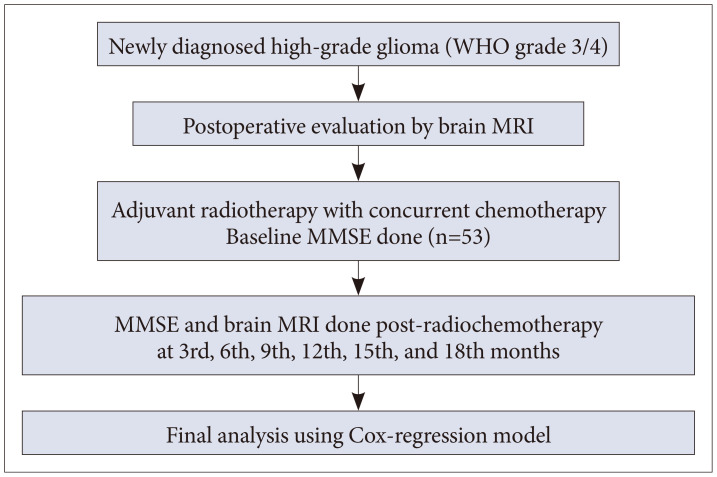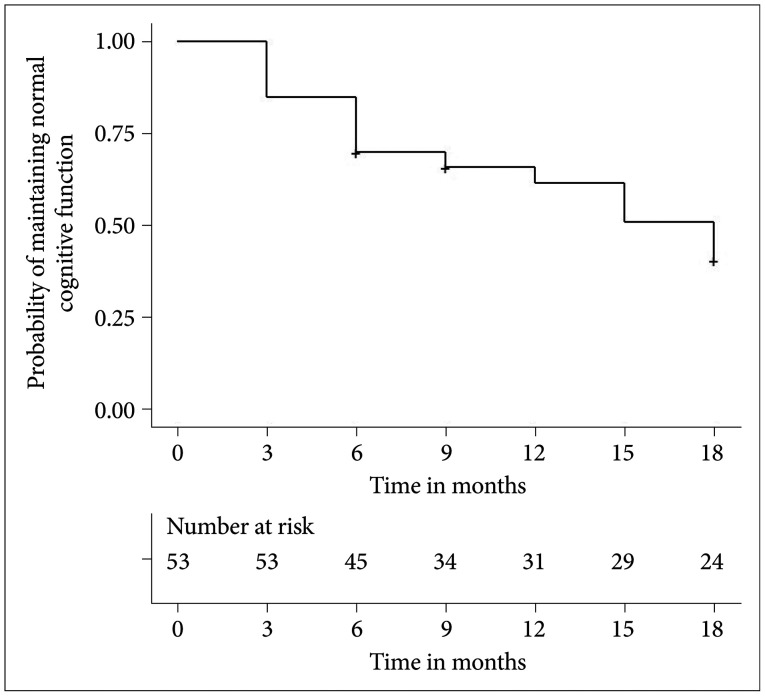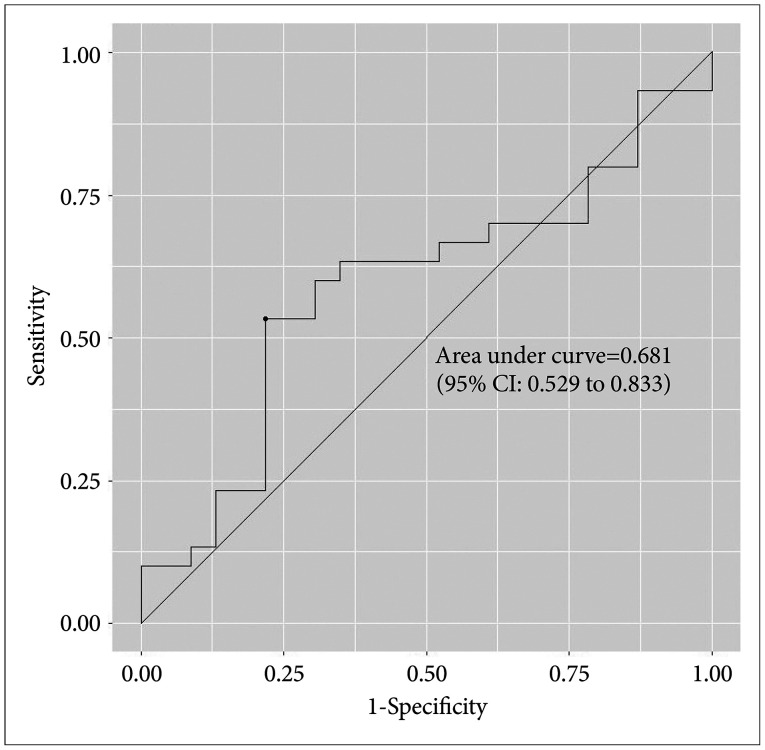Brain Tumor Res Treat.
2023 Jul;11(3):183-190. 10.14791/btrt.2023.0004.
Factors Associated With Neurocognitive Impairment Following Chemoradiotherapy in Patients With High-Grade Glioma: Results of a Prospective Trial
- Affiliations
-
- 1Department of Radiation Oncology, Dr. B. Borooah Cancer Institute, Guwahati, Assam, India
- 2Department of Radiation Oncology, All India Institute of Medical Sciences, Guwahati, Assam, India
- KMID: 2545115
- DOI: http://doi.org/10.14791/btrt.2023.0004
Abstract
- Background
High-grade gliomas (HGG) are highly fatal tumors despite advanced multimodality management. They are also associated with neurocognitive impairment, both due to disease pathology and treatment. We aimed to assess various risk factors responsible for neurocognitive decline in HGG patients undergoing adjuvant chemoradiation.
Methods
Newly diagnosed HGG patients who underwent maximal safe resection were includ- ed. Patients received volumetric modulated arc therapy to a dose of 60 Gy in 30 fractions, along with concurrent temozolomide (TMZ) at a dose of 75 mg/m2 /day orally; thereafter adjuvant TMZ (150–200 mg/m 2 for 5 days), given every 28 days for 6 to 8 cycles. The Mini-Mental State Examination questionnaire was used to measure cognitive impairment of each study patient at various time points. Cox regression model was used for univariate and multivariable analysis of data to establish possible risk factors.
Results
Fifty-three patients were enrolled and analyzed. At a median follow-up of 15 months, 30 patients (56.6%) developed cognitive impairment, and 23 patients (43.4%) did not. On univariate analysis, HGG with WHO grade 4, glioblastoma and diffuse midline glioma histology, IDH-wild type, recursive partitioning analysis class IV/V, and only biopsy of primary tumor were significantly associated with neurocognitive impairment, but none of them were independent risk factors on multivariable analysis. Planning target volume and dose received by ipsilateral hippocampus were also significantly correlated with cognitive decline in HGG patients.
Conclusion
Decline in neurocognitive functions in HGG patients is multifactorial and can be attrib-uted to an amalgam of various tumor, patient, and treatment-related factors.
Keyword
Figure
Reference
-
1. Louis DN, Ohgaki H, Wiestler OD, Cavenee WK, Burger PC, Jouvet A, et al. The 2007 WHO classification of tumours of the central nervous system. Acta Neuropathol. 2007; 114:97–109. PMID: 17618441.2. Louis DN, Perry A, Wesseling P, Brat DJ, Cree IA, Figarella-Branger D, et al. The 2021 WHO classification of tumors of the central nervous system: a summary. Neuro Oncol. 2021; 23:1231–1251. PMID: 34185076.3. Xiong L, Wang F, Qi Xie X. Advanced treatment in high-grade gliomas. J BUON. 2019; 24:424–430. PMID: 31127986.4. Mehta S, Huillard E, Kesari S, Maire CL, Golebiowski D, Harrington EP, et al. The central nervous system-restricted transcription factor Olig2 opposes p53 responses to genotoxic damage in neural progenitors and malignant glioma. Cancer Cell. 2011; 19:359–371. PMID: 21397859.5. Bock HC, Puchner MJ, Lohmann F, Schütze M, Koll S, Ketter R, et al. First-line treatment of malignant glioma with carmustine implants followed by concomitant radiochemotherapy: a multicenter experience. Neurosurg Rev. 2010; 33:441–449. PMID: 20706757.6. Elena A, Melina C, Raffaele N, Carlo B, Vittoria N, Francesco A, et al. Extraneural metastases in glioblastoma patients: two cases with YKL-40-positive glioblastomas and a meta-analysis of the literature. Neurosurg Rev. 2016; 39:37–45. discussion 45-6. PMID: 26212701.7. Santra A, Kumar R, Sharma P, Bal C, Julka PK, Malhotra A. Detection of recurrence in glioma: a comparative prospective study between Tc-99m GHA SPECT and F-18 FDG PET/CT. Clin Nucl Med. 2011; 36:650–655. PMID: 21716014.8. Stupp R, Hegi ME, Mason WP, van den Bent MJ, Taphoorn MJ, Janzer RC, et al. Effects of radiotherapy with concomitant and adjuvant temozolomide versus radiotherapy alone on survival in glioblastoma in a randomised phase III study: 5-year analysis of the EORTC-NCIC trial. Lancet Oncol. 2009; 10:459–466. PMID: 19269895.9. Henriksson R, Asklund T, Poulsen HS. Impact of therapy on quality of life, neurocognitive function and their correlates in glioblastoma multiforme: a review. J Neurooncol. 2011; 104:639–646. PMID: 21468776.10. Taphoorn MJ, Klein M. Cognitive deficits in adult patients with brain tumours. Lancet Neurol. 2004; 3:159–168. PMID: 14980531.11. Mahalakshmi P, Vanisree AJ. Quality of life measures in glioma patients with different grades: a preliminary study. Indian J Cancer. 2015; 52:580–585. PMID: 26960484.12. Acevedo-Vergara K, Perez-Florez M, Ramirez A, Torres-Bayona S, Dau A, Salva S, et al. Cognitive deficits in adult patients with high-grade glioma: a systematic review. Clin Neurol Neurosurg. 2022; 219:107296. PMID: 35662053.13. van Kessel E, Baumfalk AE, van Zandvoort MJE, Robe PA, Snijders TJ. Tumor-related neurocognitive dysfunction in patients with diffuse glioma: a systematic review of neurocognitive functioning prior to anti-tumor treatment. J Neurooncol. 2017; 134:9–18. PMID: 28567586.14. Sharma M, Juthani RG, Vogelbaum MA. Updated response assessment criteria for high-grade glioma: beyond the MacDonald criteria. Chin Clin Oncol. 2017; 6:37. PMID: 28841799.15. Folstein MF, Folstein SE, McHugh PR. “Mini-mental state”. A practical method for grading the cognitive state of patients for the clinician. J Psychiatr Res. 1975; 12:189–198. PMID: 1202204.16. Bian Y, Meng L, Peng J, Li J, Wei R, Huo L, et al. Effect of radiochemotherapy on the cognitive function and diffusion tensor and perfusion weighted imaging for high-grade gliomas: a prospective study. Sci Rep. 2019; 9:5967. PMID: 30979930.17. Weller M, van den Bent M, Preusser M, Le Rhun E, Tonn JC, Minniti G, et al. EANO guidelines on the diagnosis and treatment of diffuse gliomas of adulthood. Nat Rev Clin Oncol. 2021; 18:170–186. PMID: 33293629.18. Niyazi M, Brada M, Chalmers AJ, Combs SE, Erridge SC, Fiorentino A, et al. ESTRO-ACROP guideline “target delineation of glioblastomas”. Radiother Oncol. 2016; 118:35–42. PMID: 26777122.19. BDSS Corp. coGuide statistics software, version 1.0.3. : BDSS Corp. Bangalore: BDSS Corp.;2020. Accessed October 2 2022. https://www.coguide.in .20. Lawrie TA, Gillespie D, Dowswell T, Evans J, Erridge S, Vale L, et al. Long-term neurocognitive and other side effects of radiotherapy, with or without chemotherapy, for glioma. Cochrane Database Syst Rev. 2019; 8:CD013047. PMID: 31425631.21. Habets EJ, Taphoorn MJ, Nederend S, Klein M, Delgadillo D, Hoang-Xuan K, et al. Health-related quality of life and cognitive functioning in long-term anaplastic oligodendroglioma and oligoastrocytoma survivors. J Neurooncol. 2014; 116:161–168. PMID: 24162809.22. Wang M, Cairncross G, Shaw E, Jenkins R, Scheithauer B, Brachman D, et al. Cognition and quality of life after chemotherapy plus radiotherapy (RT) vs. RT for pure and mixed anaplastic oligodendrogliomas: radiation therapy oncology group trial 9402. Int J Radiat Oncol Biol Phys. 2010; 77:662–669. PMID: 19783377.23. Miotto EC, Junior AS, Silva CC, Cabrera HN, Machado MA, Benute GR, et al. Cognitive impairments in patients with low grade gliomas and high grade gliomas. Arq Neuropsiquiatr. 2011; 69:596–601. PMID: 21877026.24. Wang Q, Qi F, Song X, Di J, Zhang L, Zhou Y, et al. A prospective longitudinal evaluation of cognition and depression in postoperative patients with high-grade glioma following radiotherapy and chemotherapy. J Cancer Res Ther. 2018; 14(Suppl 5):S1048–S1051. PMID: 30539844.25. Hilverda K, Bosma I, Heimans JJ, Postma TJ, Peter Vandertop W, Slotman BJ, et al. Cognitive functioning in glioblastoma patients during radiotherapy and temozolomide treatment: initial findings. J Neurooncol. 2010; 97:89–94. PMID: 19718545.26. Meyers CA, Wefel JS. The use of the mini-mental state examination to assess cognitive functioning in cancer trials: no ifs, ands, buts, or sensitivity. J Clin Oncol. 2003; 21:3557–3558. PMID: 12913103.27. Nasreddine ZS, Phillips NA, Bédirian V, Charbonneau S, Whitehead V, Collin I, et al. The Montreal Cognitive Assessment, MoCA: a brief screening tool for mild cognitive impairment. J Am Geriatr Soc. 2005; 53:695–699. PMID: 15817019.28. Wang Q, Xiao F, Qi F, Song X, Yu Y. Risk factors for cognitive impairment in high-grade glioma patients treated with postoperative radiochemotherapy. Cancer Res Treat. 2020; 52:586–593. PMID: 32019288.29. Nagai R, Tsunoda S, Hori Y, Asada H. Selective vulnerability to radiation in the hippocampal dentate granule cells. Surg Neurol. 2000; 53:503–506. discussion 506-7. PMID: 10874152.30. Diaz AZ, Choi M. Radiation-associated toxicities in the treatment of high-grade gliomas. Semin Oncol. 2014; 41:532–540. PMID: 25173145.31. Madsen TM, Kristjansen PE, Bolwig TG, Wörtwein G. Arrested neuronal proliferation and impaired hippocampal function following fractionated brain irradiation in the adult rat. Neuroscience. 2003; 119:635–642. PMID: 12809684.32. Rydelius A, Lätt J, Kinhult S, Engelholm S, Van Westen D, Pihlsgård M, et al. Longitudinal study of cognitive function in glioma patients treated with modern radiotherapy techniques and standard chemotherapy. Acta Oncol. 2020; 59:1091–1097. PMID: 32847475.33. Binabaj MM, Bahrami A, ShahidSales S, Joodi M, Joudi Mashhad M, Hassanian SM, et al. The prognostic value of MGMT promoter methylation in glioblastoma: a meta-analysis of clinical trials. J Cell Physiol. 2018; 233:378–386. PMID: 28266716.34. Waitkus MS, Diplas BH, Yan H. Isocitrate dehydrogenase mutations in gliomas. Neuro Oncol. 2016; 18:16–26. PMID: 26188014.35. Bunevicius A, Miller J, Parsons M. Isocitrate dehydrogenase, patient-reported outcomes, and cognitive functioning of glioma patients: a systematic review. Curr Oncol Rep. 2020; 22:120. PMID: 32965568.
- Full Text Links
- Actions
-
Cited
- CITED
-
- Close
- Share
- Similar articles
-
- Risk Factors for Cognitive Impairment in High-Grade Glioma PatientsTreated with Postoperative Radiochemotherapy
- Molecular Culprits Generating Brain Tumor Stem Cells
- Thallium-201 SPECT Imaging of Brain Tumors
- Overview of CNS Gliomas in Childhood
- The Outcomes of Concomitant Chemoradiotherapy Followed by Adjuvant Chemotherapy with Temozolomide for Newly Diagnosed High Grade Gliomas : The Preliminary Results of Single Center Prospective Study




